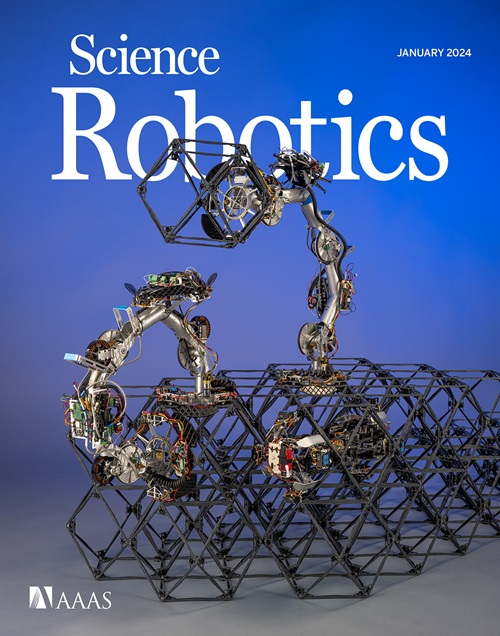Observing a robot peer’s failures facilitates students’ classroom learning
IF 27.5
1区 计算机科学
Q1 ROBOTICS
引用次数: 0
Abstract
According to productive failure (PF) theory, experiencing failure during problem-solving can enhance students’ knowledge acquisition in subsequent instruction. However, challenging students with problems beyond their current capabilities may strain their skills, prior knowledge, and emotional well-being. To address this, we designed a social robot–assisted teaching activity in which students observed a robot’s unsuccessful problem-solving attempts, offering a PF-like preparatory effect without requiring direct failure. We conducted two classroom-based studies in a middle school setting to evaluate the method’s effectiveness. In study 1 (N = 135), we compared three instructional methods—observing robot failure (RF), individual problem-solving failure, and direct instruction—in an eighth-grade mathematics lesson. Students in the RF condition showed the greatest gains in conceptual understanding and reported lower social pressure, although no significant differences were found in procedural knowledge or knowledge transfer. Follow-up study 2 (N = 110) further validated the method’s effectiveness in supporting knowledge acquisition after a 2-week robot-involved adaptation phase, when the novelty effect had largely subsided. Students confirmed their perception of the robot as a peer, and they offered positive evaluations of its intelligence and neutral views of its anthropomorphism. Our findings suggest that observing the robot’s failure has a comparable, or even greater, effect on knowledge acquisition than experiencing failure firsthand. These results underscore the value of social robots as peers in science, technology, engineering, and mathematics education and highlight the potential of integrating robotics with evidence-based teaching strategies to enhance learning outcomes.
观察机器人同伴的失败有助于学生的课堂学习
根据生产失败理论,在解决问题的过程中经历失败,可以促进学生在后续教学中的知识获取。然而,用超出他们现有能力的问题挑战学生可能会使他们的技能、先前的知识和情感健康受到影响。为了解决这个问题,我们设计了一个社交机器人辅助教学活动,在这个活动中,学生观察机器人不成功的解决问题的尝试,提供类似pf的准备效果,而不需要直接失败。我们在一所中学进行了两项以课堂为基础的研究,以评估该方法的有效性。在研究1 (N = 135)中,我们比较了八年级数学课上的三种教学方法——观察机器人失败(RF)、个人解决问题失败和直接指导。尽管在程序知识和知识转移方面没有发现显著差异,但RF条件下的学生在概念理解方面取得了最大的进步,并报告了较低的社会压力。后续研究2 (N = 110)进一步验证了该方法在2周机器人参与的适应阶段后支持知识获取的有效性,此时新颖性效应已基本消退。学生们确认了他们将机器人视为同伴的看法,他们对机器人的智能给出了积极的评价,对机器人的拟人化持中立态度。我们的研究结果表明,观察机器人的故障与亲身经历故障相比,对知识获取的影响相当,甚至更大。这些结果强调了社交机器人在科学、技术、工程和数学教育中的价值,并强调了将机器人技术与循证教学策略相结合以提高学习效果的潜力。
本文章由计算机程序翻译,如有差异,请以英文原文为准。
求助全文
约1分钟内获得全文
求助全文
来源期刊

Science Robotics
Mathematics-Control and Optimization
CiteScore
30.60
自引率
2.80%
发文量
83
期刊介绍:
Science Robotics publishes original, peer-reviewed, science- or engineering-based research articles that advance the field of robotics. The journal also features editor-commissioned Reviews. An international team of academic editors holds Science Robotics articles to the same high-quality standard that is the hallmark of the Science family of journals.
Sub-topics include: actuators, advanced materials, artificial Intelligence, autonomous vehicles, bio-inspired design, exoskeletons, fabrication, field robotics, human-robot interaction, humanoids, industrial robotics, kinematics, machine learning, material science, medical technology, motion planning and control, micro- and nano-robotics, multi-robot control, sensors, service robotics, social and ethical issues, soft robotics, and space, planetary and undersea exploration.
 求助内容:
求助内容: 应助结果提醒方式:
应助结果提醒方式:


